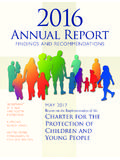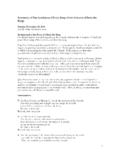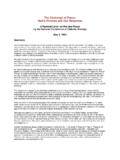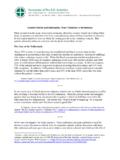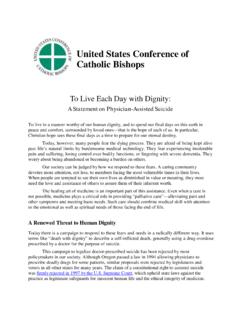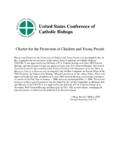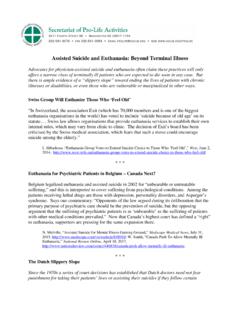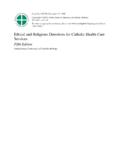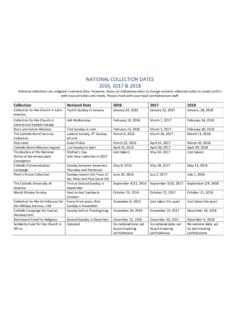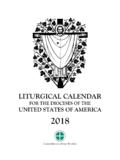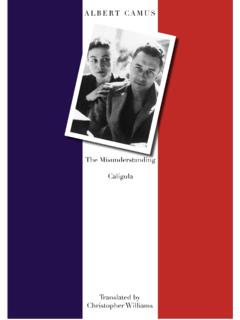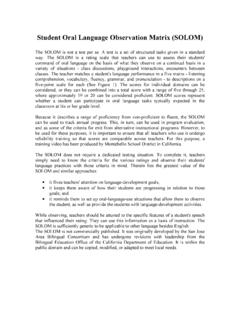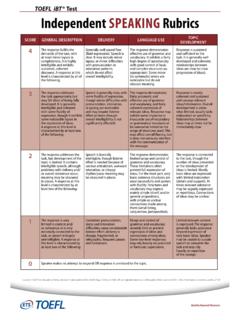Transcription of Guidelines for the Celebration of the Sacraments with ...
1 Guidelines for the Celebration of the Sacraments with persons with disabilities Revised Edition United States Conference of Catholic Bishops Washington, DC The document Guidelines for the Celebration of the Sacraments with persons with disabilities (Revised Edition) was developed by the Committee on Divine Worship of the United States Conference of Catholic Bishops (USCCB). It was approved by the full body of the USCCB at its June 2017 General Meeting. It has been directed for publication by the undersigned. Msgr. J. Brian Bransfield General Secretary, USCCB Copyright 2017, United States Conference of Catholic Bishops, Washington DC. All rights reserved.
2 1 The Church continues to affirm the dignity of every human being, and to grow in knowledge and understanding of the gifts and needs of her members who live with disabilities . Likewise, the Church recognizes that every parish community includes members with disabilities , and earnestly desires their active participation. All members of the Body of Christ are uniquely called by God by virtue of their Baptism. In light of this call, the Church seeks to support all in their growth in holiness, and to encourage all in their vocations. Participating in, and being nourished by, the grace of the Sacraments is essential to this growth in holiness. Catholic adults and children with disabilities , and their families, earnestly desire full and meaningful participation in the sacramental life of the Church.
3 In this regard, as it issues a revised and expanded Guidelines for the Celebration of the Sacraments with persons with disabilities , the United States Conference of Catholic Bishops wishes to reiterate what was said in previous pastoral statements on this issue: It is essential that all forms of the liturgy be completely accessible to persons with disabilities , since these forms are the essence of the spiritual tie that binds the Christian community together. To exclude members of the parish from these celebrations of the life of the Church, even by passive omission, is to deny the reality of that community. Accessibility involves far more than physical alterations to parish buildings.
4 Realistic provision must be made for Catholics with disabilities to participate fully in the Eucharist and other liturgical Preface Catholics with disabilities , as well as those who minister to or with them, often point out that pastoral practice with regard to the Celebration of the Sacraments varies greatly from diocese to diocese, even from parish to parish. Inconsistencies arise in such areas as the provision of sign language interpreters and captioning for persons who are deaf, in the accessibility of church facilities for persons with mobility needs, and in the availability of catechetical programs for 1 Pastoral Statement of US Catholic Bishops on persons with disabilities (November 1978, revised 1989), 23.
5 2 persons with intellectual, developmental, and other disabilities . Pastoral inconsistencies may occur in other areas as well. The inconsistencies in pastoral practice often arise from distinct yet overlapping causes. Some result from a misunderstanding about the nature of disabilities . Others arise from an uncertainty about the appropriate application of church law toward persons with disabilities . Others are born out of fear, misunderstanding, or unfamiliarity. Still others seem to be the result of the real or perceived limitations of a parish s or diocese s available resources. These Guidelines were developed to address many of the concerns raised by persons with disabilities and their families and advocates, and also clergy and other pastoral ministers, for greater consistency in pastoral practice in the Celebration of the Sacraments throughout the country.
6 with this objective in view, and with the desire to meet the spiritual, sacramental, and pastoral needs of persons with disabilities , the Guidelines draw upon the Church s ritual books, its canonical tradition, and its experience in ministering to or with persons with disabilities in order to dispel misunderstandings that may impede sound pastoral practice in the Celebration of the Sacraments . It is our hope that the Guidelines will enhance diocesan policies already in existence. The bishops of the United States offer the Guidelines for the Celebration of the Sacraments with persons with disabilities in order to give a more concrete expression to our longstanding concern for realistic provision for the means of access to full sacramental participation for Catholic persons with While they do not address every conceivable situation that may arise in pastoral practice, the Guidelines present a set of general principles to provide access to the Sacraments for persons with disabilities .
7 Diocesan staff, pastoral leaders, catechists, parishioners, health care workers, and all those who minister to or with Catholics with disabilities are invited and encouraged to reflect upon and utilize these Guidelines in their continuing effort to bring Christ s healing message and call to justice to the world. 2 The Guidelines were developed specifically for the Latin Church. They may be of assistance, however, to all Churches sui iuris in the United States, following the necessary adaptation to reflect the particular traditions, pastoral life, and requirements of the Code of Canons of the Eastern Churches. 3 I. GENERAL PRINCIPLES 1. All human beings are equal in dignity in the sight of God.
8 Moreover, by reason of their Baptism, all Catholics also share the same divine calling. 2. Catholics with disabilities have a right to participate in the Sacraments as fully as other members of the local ecclesial Sacred ministers cannot deny the Sacraments to those who seek them at appropriate times, are properly disposed, and are not prohibited by law from receiving them. 4 3. Parish sacramental celebrations should be accessible to persons with disabilities and open to their full, active, and conscious participation, according to their capacity. Pastoral ministers should not presume to know the needs of persons with disabilities , but should rather before all else consult with them or their advocates before making determinations about the accessibility of a parish s facilities and the availability of its programs, policies, and ministries.
9 Full accessibility should be the goal for every parish, and these adaptations are to be an ordinary part of the liturgical life of the 4. Since the parish is the center of the Christian experience for most Catholics, pastors and other parish ministers should make every effort to provide for all Catholics with disabilities who reside within a parish s boundaries. Special effort should be made to reach out to and welcome all parishioners, including persons with disabilities who live independently, with their families, in institutions, or in other living arrangements. Pastoral visitation, the parish census, and the diverse forms of parish and diocesan social communication are just a few of the many ways in which the pastoral staff can work toward the inclusion of all parishioners in the parish s sacramental life.
10 5. Pastors are responsible to provide evangelization, catechetical formation, and sacramental preparation for parishioners with disabilities ,6 and dioceses are encouraged to establish appropriate 3 See Codex Iuris Canonici (CIC), c. 835, 4. 4 CIC, c. 843, 1. 5 See Pope Benedict XVI, Post-Synodal Apostolic Exhortation Sacramentum caritatis (February 22, 2007), 58. 6 See CIC, c. 777, 4 . 4 support services to assist pastors in this duty. persons with disabilities , their advocates and their families, as well as those knowledgeable in serving those with disabilities can make a most valuable contribution to these efforts. Parish catechetical and sacramental preparation programs may need to be adapted for some parishioners with disabilities , though, as much as possible, persons with disabilities should be integrated into the ordinary programs.
